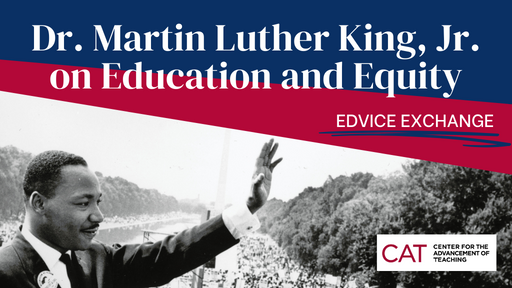Linda Hasunuma

In honor of Dr. Martin Luther King, Jr. Day, the CAT invites you to reflect on his legacy and impact on education, which was a core principle of the civil rights movement. As we begin a new year and semester of teaching, what lessons can we take from his leadership and principles as we think about our role in education and the purpose of education–not only on this important day of commemoration, but throughout the year?
In an acceptance speech he gave when he was honored by the United Federation of Teachers in 1964, Dr. King shared that “For most of the past decade the field of education has been a battleground in the freedom struggle.” … “It is precisely because education is the road to equality and citizenship that it has been made more elusive for Negroes than many other rights” (Strauss, 2012). Education continues to be a “battleground” for contesting rights over free speech and critical perspectives of US history, book bans, vaccination and masking, gun violence, and gender issues–and, most recently, over trans student rights (Obeng, 2022). In 2023, Dr. King’s message about education, critical thinking, and the ability to evaluate evidence continues to have a strong sense of urgency and relevance.
“Education must enable one to sift and weigh evidence, to discern the true from the false, the real from the unreal, and the facts from the fiction.”
“The function of education, therefore, is to teach one to think intensively and to think critically.” (from “The Purpose of Education,”)
Dr. King dedicated his life to addressing and fighting against structural and systemic inequalities, and we as educators can continue the work he began by reflecting on our own teaching practices. Do we consider how historical and structural factors impact our students’ lives, opportunities, and outcomes? How can we, as teachers, create more equitable and inclusive classrooms to honor his memory and legacy?
At Temple, we teach and learn in a vibrant intellectual community. There are many events on campus that give us and our students opportunities to engage more deeply with his ideas and legacy through discussions and acts of service on this day, and throughout the year. The new Center for Anti-Racism Research and IDEAL are hosting a critical conversation on intergenerational thoughts and actions to promote a more inclusive and socially just society for this year’s MLK 365: Keeping the Dream Alive; the Lewis Katz School of Medicine is featuring a talk by Linda Villarosa to honor his legacy of activism and service; the Maurice H. Kornberg School of Dentistry will host talks related to Dr. King from January 16-20; and there is a group reading of Dr. King’s “I Have a Dream” speech at the Temple University Bell Tower led by Klein professors David Brown, David T.Z. Mindich, and Karen Turner.
One of our most cherished resources on campus is the Blockson Collection, which houses an extensive collection of materials by and about Dr. King. The available resources include photographs and printed materials such as his speeches, letters, sermons, and articles. Next month the CAT will co-host a special workshop with the Blockson Collection for faculty interested in learning more about the Collection and resources they can use for more inclusive classes across the disciplines. Our Teaching for Equity Institute, the Can We Really Talk? series with IDEAL, and other workshops, book groups, and learning communities offer additional spaces for reflection and action as educators throughout the year.
To honor Dr. Martin Luther King, Jr’s memory, we hope that you will choose one of these opportunities to engage with others in reflecting on ways to create a more equitable educational environment for our students, one that helps fulfill Temple’s historic mission to educate “acres of diamonds.”